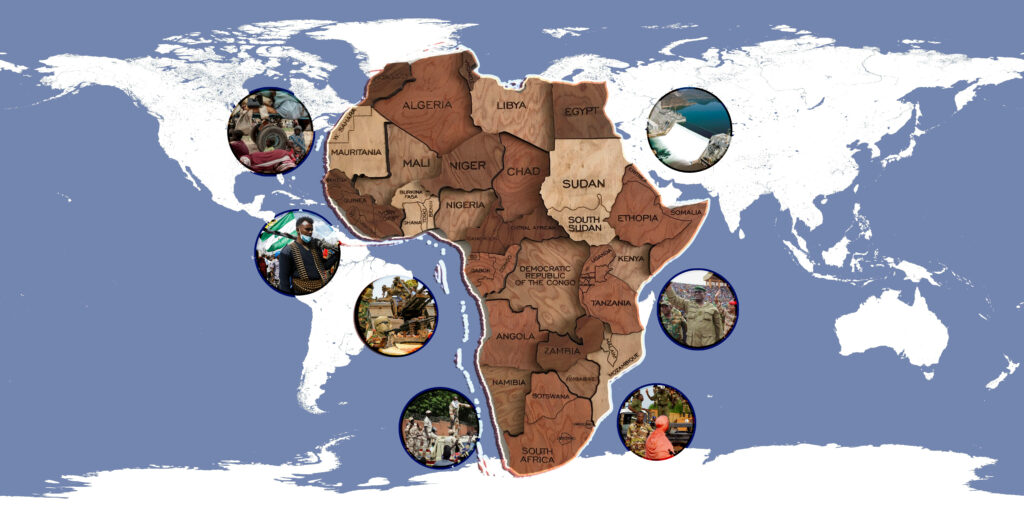
- Ethiopia’s recognition of Somaliland is primarily driven by its strategic need for access to the Red Sea, a critical shipping route linking Europe and Asia.
- The issue over the Somaliland dam has polarized the region into two blocs: one led by Egypt and Somalia, and the other led by Ethiopia with indirect support from the UAE.
- Several countries in Sahel Africa such as Mali, Burkina Faso, Niger, and Chad have experienced military coups in the past two years.
Currently, the world is witnessing significant geopolitical tensions, including crises in Ukraine and West Asia. Amidst these, there is a lesser-known but critical issue: a silent cold war unfolding across Africa, particularly in sub-Sahel Africa which has missed the attention of the world. Let us explore each trigger point in detail.
Ethiopian recognition of Somaliland
This conflict centres around Ethiopia’s Prime Minister recognizing Somaliland, a self-declared region of Somalia, and establishing agreements that include access to the port of Berbera. This move is contested by Egypt, Somalia, and others in the region.
The idea behind Ethiopia’s recognition of Somaliland’s self-proclamation lies in its strategic aim to gain access to the Red Sea, which is one of the world’s busiest shipping lanes. Initially, Ethiopia had temporary access through Djibouti but sought permanent access via Somaliland. The importance of Red Sea ports has grown in recent years, serving as a crucial gateway between Europe and Asia. However, Ethiopia’s recognition of Somaliland has been challenged and rejected by Somalia. Somalia views this move as Ethiopia’s attempt to extend its influence in the region, a sentiment not supported by Egypt and Somalia.
It is important to understand that there are two major factions at play in this region. The first faction is led by Egypt and Somalia, while the other faction is led by Ethiopia, indirectly supported by the United Arab Emirates (UAE). The UAE’s influence extends through the Horn of Africa. Egypt perceives this as an attempt by the UAE to destabilize the region and diminish Egypt’s influence, potentially allowing the UAE to derive benefits from the region through its alliance with Ethiopia’s prime minister. This situation may escalate over time and could lead to further complications in the area.
The GERD dam and its repercussions
Another significant instability contributing to potential Cold War tensions in the region involves Egypt and Ethiopia. Ethiopia, a country experiencing severe droughts, has been declared by the World Meteorological Organization to be in technical drought for three consecutive years. In response, Prime Minister Abiy Ahmed has pushed forward with the Grand Ethiopian Renaissance Dam (GERD), a highly ambitious project. This recent activity by Ethiopia has heightened concerns about reduced water flow downstream towards Egypt. Egypt says that Ethiopia’s unilateral measures disregard the interests and rights of the downstream countries and their water security. Egypt is also concerned that in times of drought, Ethiopia might fill the reservoir behind its dam with water, to increase its generating capacity, instead of letting it flow downstream.
The construction of the dam, originally planned on the Nile, remains incomplete with about 80% of the work done. Water, being a critical and contentious resource in the region, exacerbates tensions as water scarcity continues to be a significant issue.
Growing Sudanese war
Sudan has been grappling with significant political developments. In 2022, the country witnessed its first major political transition when former Prime Minister Abdullah Hamdok was removed by the military. Subsequently, in April of the following year, another military faction, known as the Rapid Support Forces, took control, leading to internal conflict against the main military forces.
The worsening political situation in other African countries
Several countries in Sahel Africa such as Mali, Burkina Faso, Niger, and Chad have experienced military coups in the past two years. These events have resulted in ongoing political instability in the region, sparking significant geopolitical tensions. These coups, initiated by military factions who were backed by Russia, have led to the removal and replacement of governments that previously had Western support. The primary goal of these new governments is to diminish Euro-Atlantic influence in the region, further complicating an already complex situation.
References:
- https://www.controlrisks.com/our-thinking/insights/africa-ten-key-issues-to-watch-in-2024
Aayush Pal is a freelance writer on contemporary geopolitical developments. The views expressed in his work are entirely his own.
